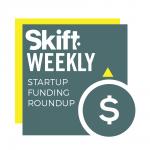Skift Take
Another two AI-powered trip planners have raised money this month, plus a startup that detects bed bugs and a new eSIM app.

Travel Startup Funding This Week
Each week we round up travel startups that have recently received or announced funding. Please email Travel Tech Reporter Justin Dawes at [email protected] if you have funding news.
Four travel tech startups announced fundraises over the past two weeks totaling more than $15 million.
Steller, an AI-powered trip planner and social media app, has raised $5 million from Pioneer Venture Partners and other investors.
It is part of a series B funding round of $22 million that has been raised over the past couple of years. Washington-based Steller has raised $42 million to date, according to an email from Annette Eyraud, the startup’s chief operations officer and chief financial officer.
The latest funding is going toward product development that includes the recent upgrades. The updated app is a trip planning tool that integrates social media videos about destinations, which is a primary way that younger generations use to plan travel.
Steller allows users to search for travel options by destination and then explore options for activities, lodging, and more. There’s also a social media aspect, allowing users to post videos to their profiles and follow others. Users can also create guides and itineraries, such as a weekend getaway in Austin, Texas, to share with others.
“By uniting this engaging content with destination details, curated trips from experts, interactive maps, an AI-enhanced trip planner, and booking functionality, Trips offers a comprehensive and intuitive social commerce solution for the travel industry,” Steller said in a statement.
Steller has integrations with tours and activities booking platform Viator and hotel search site Trivago, with more partnerships underway.
Lokalee: $5.6 Million
Lokalee, a trip planning platform for guests of hotels and vacations rentals, has raised $5.6 million received in pre-series A funding.
It was led by Crown Private Fund, with support from three other investors.
The Dubai-based Lokalee platform is meant to help guests to more easily browse and book amenities and local activities offered by a hotel. Client companies can integrate the tech within their own websites.
Features include a digital concierge and chatbot, as well as customized itineraries and recommendations.
The startup plans to release an AI-powered trip planner.
The startup has 250 hotel clients in 20 countries and last year expanded into Austria, Germany, and Saudi Arabia. Clients include Movenpick, Sheraton, Rotana, Sofitel, Hilton, and Millennium.
The funding will go toward product development acceleration and further expansion into Europe.
Spotta: $3.8 Million
Spotta, a tech company that says it can detect bed bugs in hotel rooms, has raised £3 million ($3.8 million) in a growth investment round.
It was led by The Yield Lab, STIHL Ventures, and ACF Investors, with support from Martlet, Wren Capital, Remus Capital, Growthworks, Cambridge Angels, and Cambridge Capital Group.
UK-based Spotta said it provides hotels and other companies with “ultra-low-power” sensors that use AI to track pests so that infestations can be stopped early.
The company said its platform shows which types of insects are present, as well as when and where they are active. The sensor fits underneath mattresses in hotel rooms and provides real-time data that includes the hotel room number and photos.
“The approach to insect detection has remained unchanged for decades. Infestations are found too late, after the damage is done. Spotta changes this,” said Robert Fryers, CEO and co-founder of Spotta, in a statement. “The timing of our investment round coincided with the recent Paris bed bug infestation, which only reinforced the need for safe, effective and cost-efficient preventative measures like Spotta.”
The funding will go toward expanding in the hospitality industry as well as the industries of agriculture, forestry, and horticulture.
The startup raised $1.2 million in seed funding in 2020.
Firsty: $1.2 million
Firsty, an app that offers international mobile data coverage without continually switching eSIMS or data plans, has raised $1.2 million (€1.1 million) in pre-seed funding.
Investors include Marcel Smits, Godert Vinkesteijn, and Patrick Stal.
Amsterdam-based Firsty said it is able to unlock global connectivity for customers by integrating with key regional telecom providers, meant to help customers avoid high roaming costs or manually switching eSIMS for each destination. Users’ mobile devices will automatically connect to the best available provider based on their location, the company said.
A beta version of the app is coming this month to Europe, the UK, Turkey, Switzerland, and the U.S. Global coverage will come online over the first quarter of this year, the company said.
The service has two plans: a free low-speed version and a paid high-speed version. The app shows that paid plans for the U.S. and Europe start at €3.50 per day and decrease in daily price as more days are added, down to €1.98 per day for 30 days. The app requires a one-time eSIM download.
| Company | Stage | Lead | Raise |
|---|---|---|---|
| Steller | Series B | Pioneer Venture Partners | $5 million |
| Lokalee | Pre-series A | Crown Private Fund | $5.6 million |
| Spotta | Unspecified | The Yield Lab, STIHL Ventures, and ACF Investors | $3.8 million |
| Firsty | Pre-seed | Unspecified | $1.2 million |
Skift Cheat Sheet
Seed capital is money used to start a business, often led by angel investors and friends or family.
Series A financing is typically drawn from venture capitalists. The round aims to help a startup’s founders make sure that their product is something that customers truly want to buy.
Series B financing is mainly about venture capitalist firms helping a company grow faster. These fundraising rounds can assist in recruiting skilled workers and developing cost-effective marketing.
Series C financing is ordinarily about helping a company expand, such as through acquisitions. In addition to VCs, hedge funds, investment banks, and private equity firms often participate.
Series D, E, and, beyond These mainly mature businesses and the funding round may help a company prepare to go public or be acquired. A variety of types of private investors might participate.
Skift AI Travel Newsletter
AI coverage across travel sectors that’s focused on separating trendy moves from good ideas – in your inbox every Friday.
Have a confidential tip for Skift? Get in touch
Tags: artificial intelligence, hotel tech, startups, travel tech, venture capital
Photo credit: Pictured: Downtown Austin and Lady Bird Lake, facing west. Gino Barasa / Austin Convention and Visitors Bureau
